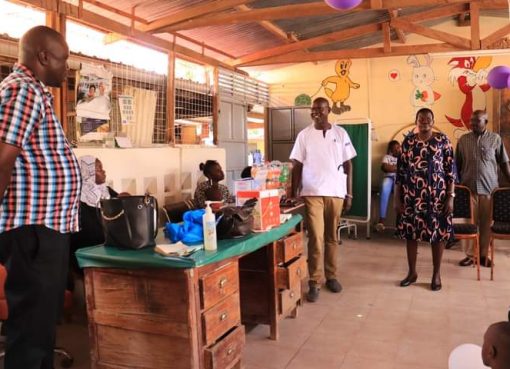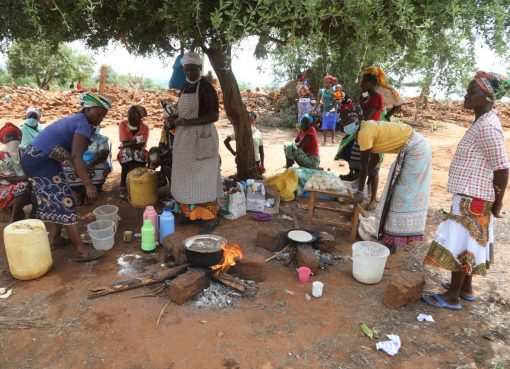At least 4,000 small holder farmers in Nakuru are set to benefit from the Sh 114 million Kenya Rural Transformation Centres Digital Platform (KRTCDP) that will put the farmers at the centre of a single electronic platform.
The platform is set to connect them with all actors along the agricultural sector value chain, including the Meteorological Department to help them get timely information and forecasts to transform their farming activities.
According to the County Executive Committee Member (CECM) for Agriculture, Fisheries and Livestock Mr Leonard Bor, the digital platform which was created by the Cooperative University of Kenya (CUK)with financial aid from the African Development Bank to fill the gap in the value chain, will be piloted by the University in partnership with the Kenyan government in a two and a half year programme.
The CECM said the platform which serves as a centralized depository where farmers can access timely information on weather and other key information such as the market and farm inputs, also seeks to link smallholder farmers with all relevant stakeholders on the same digital platform, hence creating a one-stop shop for all the producers.
Mr. Bor further explained that the platform will help farmers in decision-making through access to agribusiness services and information such as the broadcast of agricultural-cycle, information on weather forecasts and wholesale and retail commodity prices.
According to the County official, the open-source and cost-friendly digital system is meant to store information on production, membership, financial strength, business processes, markets, and service providers, targeting 152 cooperatives on a pilot basis.
“The one-stop digital platform will link dairy, maize, and Irish potato cooperative societies in Nakuru, Baringo, Nyandarua and Narok Counties to markets and service providers,” added the CECM.
Mr Bor was happy that Forty-one farmer cooperative leadership and value chain actors had taken part in the prototype testing and validation workshop where they gave their views and inputs and provided areas of improvement on the platform to suit their needs.
The CECM noted that lack of information, knowledge, and data about the market where farmers are able to sell their produce had always been a challenge adding there have been increased struggle where farmers are not aware of the suppliers, extension service providers, equipment, and financial institutions to support their production. “Through this digital platform, they will be able to know who is in their space and whom they can quickly reach and access information from,” Mr Bor indicated.
He gave an example of a person who notices a symptom in an animal, or even in a crop, saying they will now be able to take a picture of the same, put it onto this digital platform to pass information, and then wait to be attended to by the extension service provider, who will be on the platform.
The CECM elaborated that the system will also be expected to share details of all service providers, veterinary officers, equipment, extension officers, financial institutions, agro-vet dealers, and trade associations, so that the farmers are well aware of them and their locations in that space from whom they can seek quick information.
Saying the project will go a long way towards the achievement of some of the government’s set objectives, the CECM explained that as per the Agriculture Sector Transformation and Growth Strategy (2019-2029), the project will address the issue of enhanced agricultural productivity and the formation of Special Agro Processing Zones.
The project and digital centres, added Mr Bor, will also attract youth in agriculture and this, he noted, will be a game changer that will also create jobs and ensure the continuity in the agriculture sector.
KRTCDP Coordinator Professor Ken Waweru explained that the system will embrace traders, giving them the opportunity to track surplus food production in the market and know prevailing prices, thus easing the burden of farmers and cooperatives holding onto the produce, which can increase post-harvest losses.
Professor Waweru who is also the Director of Research and Innovation at Cooperative University of Kenya further noted that the project has attracted potential financial providers interested in bankrolling the project, once it is extended to other countries after the pilot in March 2025.
He pointed out that the unique feature of this platform is that, unlike others, which have stand-alone modules for each value chain, this one incorporates all the modules that are important to the farmer into one single platform.
“You will find a very advanced ticketing system that helps farmers solve their issues. At the same time, it also helps the farmers with their bookkeeping and journal entry, thus solving the problem of fragmented technologies,” he said.
He termed the platform as one big ecosystem that empowers farmers through their cooperatives, and it is therefore a must for any farmer who wants to use it to have a smart control resource system, which currently has three main access channels, namely Laptop, Mobile App and USSD.
By Esther Mwangi




